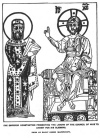
The Lost Books of the Bible, [1926], at sacred-texts.com

Click to enlarge
THE EMPEROR CONSTANTINE PRESENTING THE LABORS OF THE COUNCIL OF NICE TO CHRIST FOR HIS BLESSING. FROM AN EARLY GREEK MANUSCRIPT.
PREFACE
YOU will find between these covers all the ecclesiastical writings of early Christian authorities that are known to exist, and yet were omitted from the authorized New Testament.
They are published here as a matter of record. Whether they are canonical or not, at least these writings are of very great antiquity.
Origins are noted in paragraphs at the front of each book. This will enable the reader to form his own conclusions as to the genuineness of the writings. These writings are a vivid picture of the minds of men in the post-Apostolic period of the Church. Discount the statements from the historical viewpoint as you will—there remains in these gospels and epistles an earnestness of purpose, and zeal to express a message, similar to that of our authorized Bible.
An interesting question naturally arises as to why these writings were cast out in the selection of the material that has come down to us in the authorized version.
The compilation of the Bible was not an act of any definite occurrence. It was a matter complicated and abstruse. It was an evolution at the hands of Churchmen of various beliefs and purposes. In the formulation of early church doctrines there was dissension, personal jealousy, intolerance, persecution, bigotry. That out of this welter should have arisen the Bible, with its fine inspiration, would seem to present a plausible basis for belief in its Divine origin.
But who can deny that under such vicious and human circumstances much writing of as pure purpose and as profound sincerity as other that is included in the authorized Bible, must have been omitted? The story of the first council of Nice, when Arius was commanded by the Bishop of Alexandria to quit his beliefs or be declared a heretic, and his writings were ordered destroyed, is eloquent of many things that happened. Good men were engaged on both sides of the ecclesiastical controversies.
About two thirds of this volume is occupied with epistles. Beginning on page 91 you will discover otherwise generally unknown letters of Paul; and the illuminating letters of Clement and others, concluding with correspondence and reports of Herod, Pontius Pilate, and Tiberius Cæsar.
Concerning these epistles Archbishop of Canterbury Wake, who translated them from the originals, says that here is a full and perfect collection of "all the genuine writings that remain to us of the Apostolic Fathers, and carry on the antiquity of the Church from the time of the Holy Scriptures of the New Testament to about a hundred and fifty years after Christ; that except the Holy Scriptures, there is nothing remaining of the truly genuine Christian antiquity more early; that they contain all that can with any certainty be depended upon of the most Primitive Fathers, who had not only the advantage of living in the apostolical times, of hearing the Holy Apostles, and conversing with them, but were most of them persons of a very eminent character in the church, too: that we cannot with any reason doubt of what they deliver to us as the Gospel of Christ, but ought to receive it, if not with equal veneration, yet but a little less respect than we do the Sacred Writings of those who were their masters and instructors;" and, "if," says the Archbishop, "it shall be asked how I came to choose the drudgery of a translator, rather than the more ingenious part of publishing somewhat of my own composing, it was, in short, this; because I hoped that such writings as these would find a more general and unprejudiced acceptance with all sorts of men than anything that could be written by anyone now living."
___________________________
This collection of The Lost Books of the Bible, is published, without prejudice or motive, save that the reader may find whatever pleases and instructs him, and may be free to enjoy his own speculation and hold his own opinion of these ancient and beautiful writings.
R.H.P., Jr.
New York, January 1, 1926.
